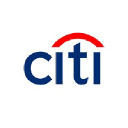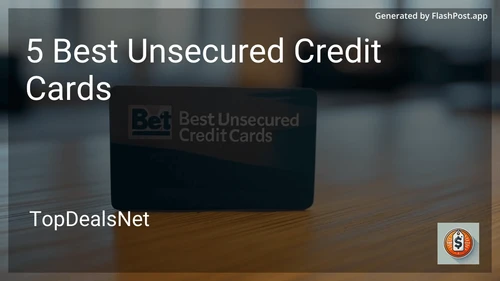Best Unsecured Credit Cards in March 2026

Chase Freedom Unlimited®
- Unlimited 1.5% cash back on every purchase.
- 5% cash back on travel purchased through Chase Ultimate Rewards.
- 3% on dining and drugstore purchases.
- No annual fee.
- Intro APR offer.

Capital One Quicksilver Cash Rewards Credit Card
- Unlimited 1.5% cash back on every purchase, every day.
- No rotating categories or sign-ups needed to earn cash rewards.
- No annual fee.
- Intro APR offer on purchases.
- No foreign transaction fees.

Discover it® Cash Back
- 5% cash back on everyday purchases at different places each quarter like Amazon.com, grocery stores, restaurants, gas stations, and when you pay using PayPal, up to the quarterly maximum when you activate.
- Unlimited 1% cash back on all other purchases.
- Automatic cash back match for new cardmembers at the end of the first year.
- No annual fee.
- Access to your FICO® Credit Score for free.

Citi® Double Cash Card
- Earn 2% on every purchase with unlimited 1% cash back when you buy, plus an additional 1% as you pay for those purchases.
- No annual fee.
- Balance transfer offer.
- No categories to track or sign-ups needed.

American Express Cash Magnet® Card
- Unlimited 1.5% cash back on your purchases.
- Introductory APR offer.
- Variety of travel and purchase protections.
- No annual fee.
- Access to the Amex Offers and benefits.
Navigating the world of credit cards can be a daunting task, especially if you are just starting on your credit journey or looking to improve your financial health. Unsecured credit cards, which do not require a security deposit, are a popular choice for consumers aiming to build or rebuild their credit or enjoy financial flexibility. This article provides an overview of unsecured credit cards and guidance on how to choose the best one for your needs.
What Are Unsecured Credit Cards?
Unsecured credit cards are a type of credit card that does not require the cardholder to put down a security deposit as collateral. They are the most common type of credit card and are offered by a variety of financial institutions. These cards provide a line of credit which can be used to make purchases, and the cardholder is required to pay back at least a portion of the balance each month.
Key Features of Unsecured Credit Cards
Choosing the best unsecured credit card involves understanding some key features, which can vary widely among different cards:
Interest Rates
One of the most important aspects to consider is the APR (annual percentage rate). The APR can vary greatly between credit cards, with some offering introductory low rates that later increase. Understanding the ongoing APR is crucial, especially if you anticipate carrying a balance month-to-month.
Credit Limit
The credit limit is the maximum amount you can borrow using your card. Higher credit limits offer more spending flexibility but could also lead to greater debt if not managed wisely. Carefully evaluate your spending habits and financial capacity when considering the credit limit of a prospective card.
Fees
Many unsecured credit cards come with various fees, such as annual fees, late payment fees, foreign transaction fees, and balance transfer fees. Being aware of these potential charges can help you avoid unexpected costs. Some cards may offer no annual fees or waive certain fees for the first year, which can be beneficial for budget-conscious individuals.
Rewards and Incentives
Many unsecured credit cards offer rewards programs that may include cashback, points, or travel miles. While rewarding, it's crucial to assess whether the benefits align with your spending habits. For instance, if you travel frequently, a card that offers airline miles might be more advantageous than a cashback card.
How to Choose the Best Unsecured Credit Card
Choosing the best unsecured credit card goes beyond just comparing rates and fees. Here are some steps to help streamline your decision-making process:
Evaluate Your Financial Situation
Before selecting a card, assess your current financial situation. Understand your credit score and report, as these will significantly influence your eligibility for certain cards and the terms offered. Knowing whether you can afford to pay the balance in full each month is also critical, as carrying a balance could lead to substantial interest charges.
Determine Your Spending Habits
Identify your spending patterns to find a credit card that complements your lifestyle. If you spend heavily in certain categories like dining, groceries, or travel, search for cards that offer higher rewards rates in those areas.
Read the Fine Print
Once you've narrowed down your options, read the cardholder agreements carefully. Pay attention to terms regarding interest rates, fees, rewards redemption, and any promotional offers. This helps ensure you’re aware of all possible costs and how they might affect your finances.
Consider Credit-Building Features
For those with a limited credit history or poor credit, opting for a card with credit-building features can be beneficial. Look for cards that offer free credit score monitoring or educational tools to help improve your financial literacy and credit management skills.
Compare Customer Reviews
Finally, consider consumer reviews and ratings. Hearing from other cardholders can provide valuable insights into customer service quality, any hidden issues, or the true value of card benefits.
Conclusion
Selecting the best unsecured credit card requires careful consideration of several factors, including interest rates, credit limits, fees, rewards, and your personal financial situation. By taking the time to understand these aspects and considering your unique needs and goals, you can choose an unsecured credit card that fits seamlessly into your financial life, helping you to build credit and enjoy spending freedom without the burden of a security deposit.
